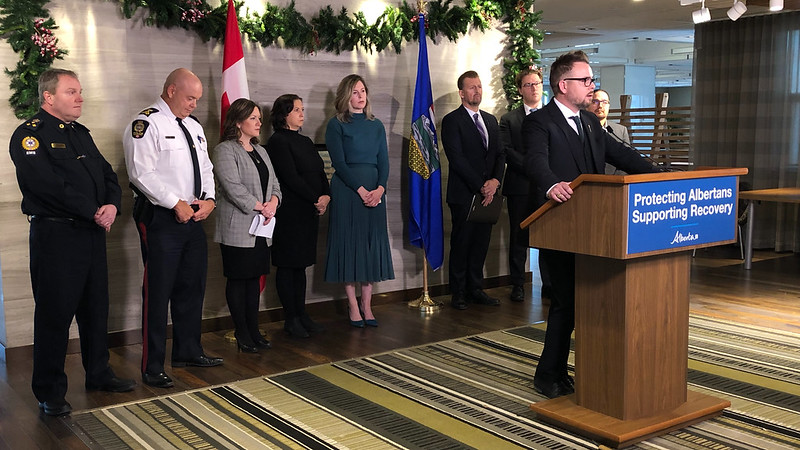Addiction, homelessness and public safety issues have affected every community in Alberta, with Edmonton being especially hard hit. To address these issues and build on the province’s recovery-oriented system of addiction and mental health care, Alberta’s government is forming the Edmonton Public Safety and Community Response Task Force.
The task force will implement a series of initiatives in the Edmonton metropolitan region as part of a $187-million commitment to address addiction and homelessness in Alberta’s urban centres. In Edmonton, $63 million of this funding will go toward dramatically increasing access to addiction services and supports over the next two years, and $19 million has been allocated to combat homelessness.
“Addiction has become one of the most urgent social issues facing our province, and one of the most complex. This task force will bring community partners together to implement a series of recovery-oriented initiatives, enhancing public safety and improving addiction and mental health care in Edmonton.”
“Addiction impacts a person’s well-being and drives them to do things that put themselves and others at risk. I saw this first hand during my time with the Calgary police. By bringing all the key community members together, we can build trust within the community that will result in better public safety.”
The initiatives the task force is responsible for implementing will help provide more life-saving services to Edmontonians struggling with addiction and homelessness while enhancing public safety within the city. This work will include:
-
further increasing addiction treatment capacity in Edmonton
-
providing addiction and mental health treatment programs in correctional centres
-
creating a hybrid health and police hub
-
expanding medical detox services
-
building harm reduction and recovery outreach teams
-
expanding access to emergency shelter space
 Ministers Milliken, Ellis, Nixon and Schulz along with other Edmonton Public Safety and Community Response Task Force members in Edmonton on Dec. 13.
Ministers Milliken, Ellis, Nixon and Schulz along with other Edmonton Public Safety and Community Response Task Force members in Edmonton on Dec. 13.“The number of Albertans facing homelessness and addiction continues to be a top of mind concern for me. I spent many years working in homeless shelters and connecting with those facing challenges of addiction. I am very optimistic about the creation of this task force to find long-term solutions to support Albertans in need.”
“We’ve heard from communities across Alberta about the need for a collaborative approach to help address issues of addiction and mental health. Our government is committed to building strong, resilient communities, and we are happy to be working in partnership with local leaders and organizations to deliver support to Albertans who need it.”
Task force members are:
-
Nicholas Milliken, Minister of Mental Health and Addiction
-
Mike Ellis, Minister of Public Safety and Emergency Services (chair)
-
Jeremy Nixon, Minister of Seniors, Community and Social Services
-
Rebecca Schulz, Minister of Municipal Affairs
-
Chief Billy Morin, Enoch Cree Nation
-
Chief Isaac A. Laboucan-Avirom, Woodland Cree First Nation
-
Tim Cartmell, pihêsiwin Ward councillor, City of Edmonton
-
Sarah Hamilton, sipiwiyiniwak Ward councillor, City of Edmonton
-
Dale McFee, chief of police, Edmonton Police Services
-
Kerry Bales, senior program officer, Provincial Addiction and Mental Health, Alberta Health Services
-
Graeme McAlister, associate executive director, EMS Operations, Alberta Health Services Edmonton Zone
-
Susan McGee, chief executive officer, Homeward Trust
Also invited, pending City of Edmonton approval:
-
Andre Corbould, city manager, City of Edmonton
-
Joe Zatylny, fire chief, Edmonton Fire Rescue Services
The Edmonton Public Safety and Community Response Task Force will meet for the first time on Dec. 13.
“I want to help be a part of the solution. We are facing an addiction crisis right here in our Nation. Our people face obstacles of intergenerational trauma and as a result, mental health and addiction issues are deeply impacting our families and communities. Addiction is more than an individual issue. It impacts us all: our children, our members, our community. There’s an imbalance physically, emotionally, mentally and spiritually. We need to do better for our people, our Nation. This task force is a step in the right direction and the positive impacts can be multi-generational.”
“This is a broad, integrated partnership that reaches across jurisdictions and departments and holds a foundational belief that community wellness must be built in tandem with community safety. The integrated approach here was called for across the province’s housing, mental health and addiction and human trafficking task forces. It is essential leadership if we are going to unpack the multi-layered issues impacting those dealing with addiction, mental health and homelessness, and I am pleased to see the province move forward with this urgent work.”
Alberta spends more than $1 billion annually on addiction and mental health care and supports, including prevention, intervention, treatment and recovery. This includes adding more than 8,000 new publicly funded treatment spaces; eliminating daily user fees for residential addiction treatment; launching the Digital Overdose Response System (DORS) app; expanding opioid agonist treatment; and fully covering the cost of the injectable opioid treatment drug Sublocade.
Quick facts
-
Albertans experiencing addiction or mental health challenges can contact 211 for information on services in their community.
-
Albertans struggling with opioid addiction can contact the Virtual Opioid Dependency Program (VODP) by calling 1-844-383-7688, seven days a week, from 8 a.m. to 8 p.m. daily. VODP provides same-day access to addiction medicine specialists. There is no wait-list.
-
There are more than 28,000 visits per year to emergency departments in Alberta hospitals by patients of no fixed address. The vast majority of these patients are being discharged from emergency departments back into homelessness with little or no supports.
-
Each patient that experiences homelessness costs the health-care system 43 per cent more than the average patient, around $115,000.